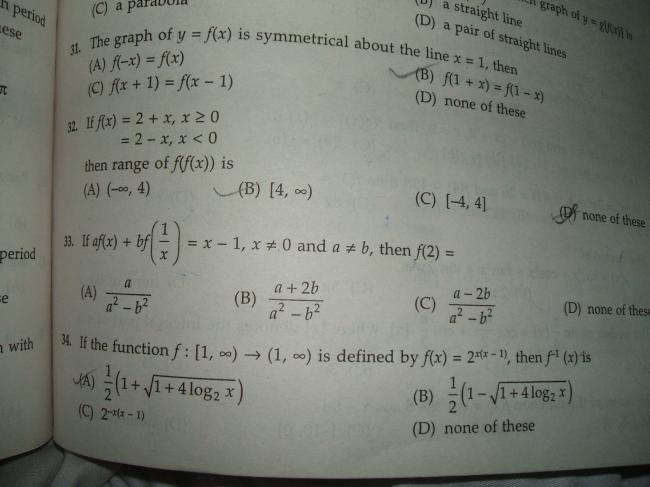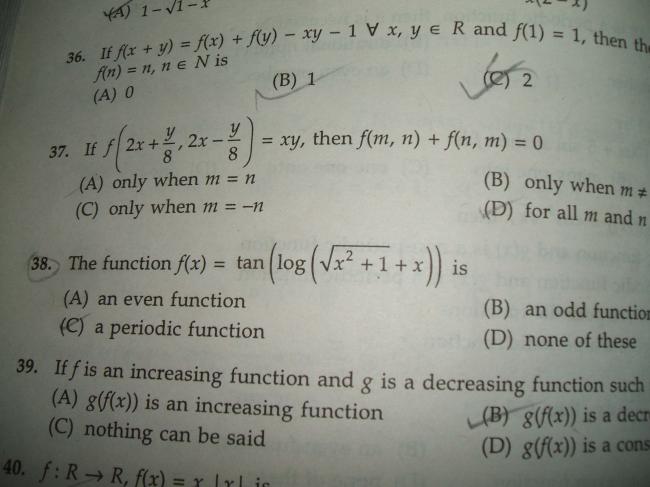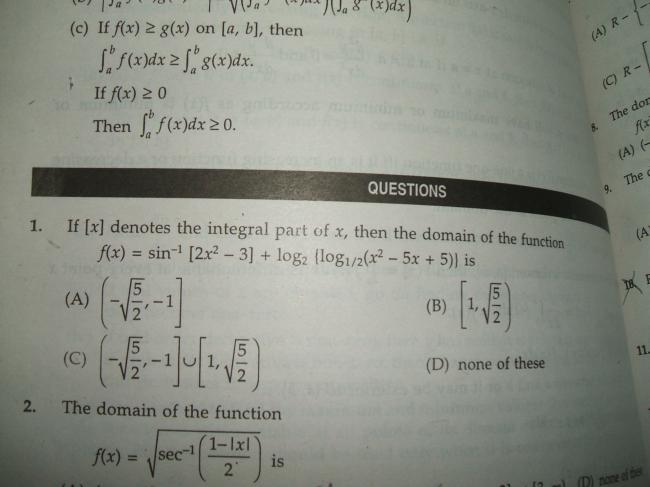 1
1Answer for 33 is NONE OF THESE ..D
af(x) + bf(1/x) = x-1 ......... i
we can replace x by 1/x
af(1/x) + bf(x) = 1/x -1 ......... ii
add eq 1 and 2
af(x) + bf(1/x) + af(1/x) + bf(x) = x-1 +1/x -1
( a + b )( f(x) + f(1/x) ) = x + 1/x -2
f(x) + f(1/x) = ( x + 1/x -2 )/( a + b )
f(1/x) = ( x + 1/x - 2 )/( a + b ) - f(x)
substituting the value of f(1/x) in equation 1
f(x) =( x-1 - b (( x + 1/x - 2 )/( a + b )) )/(a-b)
f(2) = (2a + b)/2(a+b)(a-b) = (2a + b)/2(a2 - b2)
 1
1i mean xplanation.............is it proper??
 11
11yup gsns Mr Ankit was correct but i made simple question tough 4 me [1]
 11
11@ANKIT #11
UR ANSWER IS CLOSE TO BEING PERFECT
BUT A NICE TRY
1 KE SAATH EQUALITY AAEGE
BAAKI SAB THEEK
 1
1hey in 2nd 1
ll d ans b 1≤x≤2
n hence ans is none??
 1
1haan yaar 1 ke saath = hai .. i got it ..
 11
11TRY QUESTIONS
33 AND 38 RESPECTIVELY[1]


 1
138
Is the answer to the 38 Q, b [7][7][7]
f(x)+f(-x)=tan[log(√(x2+1)+x)(√(x2+1)-x)]/[1-log(√(x2+1)+x)log(√(x2+1)-x)]
= tan[(log1)/~]
=tan0 =0
therefore f(x)=-f(-x)
 1
1chat box mein bata dena dude !!
 1
1oye kalyan u r on9 .. check kar le na mera soln. dude !!
 1
1even I got same . as ankit
 11
1138
f(x)=tan[log(√1+x2+x)]
-f(x)=tan\left[-log\left(\sqrt{1+x^2}+x \right) \right]
=tan\left[log\left(\frac{1}{\sqrt{1+x^2}+x} \right) \right]
rationalising, we get
=tan\left[log\left(\sqrt{1+x^2}-x} \right) \right]
which is
=tan\left[log\left(\sqrt{1+(-x)^2}+(-x)} \right) \right]
=f(-x)
i.e......f(-x)=-f(x)
Hence the answer is (b)....f(x) is an odd function [4]
 11
11yes ani u ,kalyan and ankit all r right
 1
1yaar my answer is coming as D
 11
11bhavnaaon ko samjho galti hao gaya
CALCULUS
 1
1b ... [0,1) .. not in domain at x=1 .. neither below 0 ..
.. i am correct na ?
 1
1are abhrupi galat answer delete mat kiya karo .. ... [50]
 11
11ANKIT I NEVER SAID U TO HIDE UR ANSWERS
I TOLD U TO GIVE THE COMPLETE SOLUTION
AS PER UR OPINION CONSIDER POINT 2/3
 1
1are yaar likhe toh hai .. the reason ..
 1
1do u expect to solve these kinds of sums the conventional way !!
 1
1this is not a blind answer ... yaar u r in 12 use some logic .. [50]
 11
11U WERE RIGHT ANKIT
SORRY 4 THE INCONVENIENCE
NOW
Q2(TRY THE 1ST ONE )

 11
11IF D THEN POST UR ANSWER 4 IT [1]
 1
1accha toh mera majak udane ka irada hai ...
 11
11NAHIN BHAI U R CORRECT AS USUAL
BUT PLEASE POST THE SOLUTION (ANSWER ) TO IT


